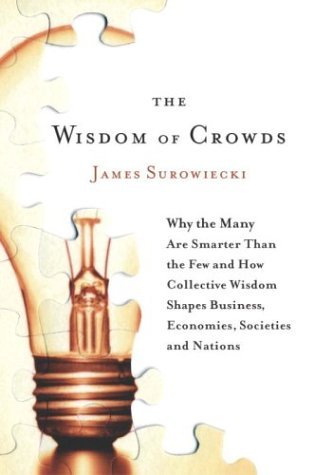 |
||
|
|
Join
The Miami Herald's Business Monday Book Club.
Click here for information.
Music Reviews and Features
Dion Dimucci
Lester Bangs in "Almost Famous"
History of Warner Brothers Music
Food & Dining
Creolina's
Cajun/Creole
The Wisdom of Crowds: Why the Many Are Smarter Than the Few and How Collective Wisdom Shapes Business, Economies, Societies and Nations. James Surowiecki. Doubleday & Co. 288 pages.
BY RICHARD PACHTER
rpachter@wordsonwords.com
Mostly, we value the expertise, opinions and pronouncements of individuals:
specialists, authorities, academics, senior executives, et al.
And why not? They've studied the issues and possess the experience and
knowledge to sift through the appropriate data, arriving at just the right
conclusions.
But that's not always right, according to author James Surowiecki, a columnist for The New Yorker. His new book presents a lively case for ignoring the obvious and accepting the somewhat counterintuitive proposition that the masses are much wiser than we think.
Here's a passage that introduces this principle in terms we masses can understand: ``Who Wants to Be a Millionaire? pitted group intelligence against individual intelligence, and ... every week, group intelligence won. The show's gimmick was that if a contestant got stumped by a question, she could pursue three avenues of assistance. First, she could have two of the four multiple-choice answers removed (so she'd have at least a fifty-fifty shot at the right response). Second, she could place a call to a friend or relative, a person whom, before the show, she had singled out as one of the smartest people she knew, and ask him or her for the answer. And third, she could poll the studio audience, which would immediately cast its votes by computer. Everything we think we know about intelligence suggests that the smart individual would offer the most help. And, in fact, the 'experts' did OK, offering the right answer -- under pressure -- almost 65 percent of the time. But they paled in comparison to the audiences. Those random crowds of people with nothing better to do on a weekday afternoon than sit in a TV studio picked the right answer 91 percent of the time.''
That's remarkable, but even more so is another example recounted by Surowiecki: a search for a lost submarine. A possible scenario of the calamity and its ultimate location was constructed by compiling the collective wisdom (and guesses) of a number of experts. The result was an assembled jigsaw puzzle delineating the lost vessel's final resting place. Surowiecki employs eclectic anecdotes and other seemingly disparate historical references to illustrate the various manifestations of this phenomenon, but no axes are ground; his thoughtful and intelligent discussion includes more than a bit of skepticism combined with a sense of wonder
In business, one might find the implications of his findings useful, but like many discoveries, a little knowledge can be perilous. For example, corporate innovators frequently rely upon focus groups for feedback on specific features of a new or retooled product. This can be an extremely useful method of gauging consumers' or other relevant parties' reactions and likelihood of acceptance. On the surface, Surowiecki's views may confirm the underlying assumptions behind this sort of testing. However, focus groups' findings also provide subjective rather than objective data, and if I've read him right, in light of his discoveries, useful interpretation and application will require considerably more intuition than previously assumed a notion that may also be counter-intuitive!
Regardless, The Wisdom of Crowds is an interesting and truly consciousness-expanding study by an author who can present complex ideas in an engaging manner. Highly recommended.
Like business books? Join the club.